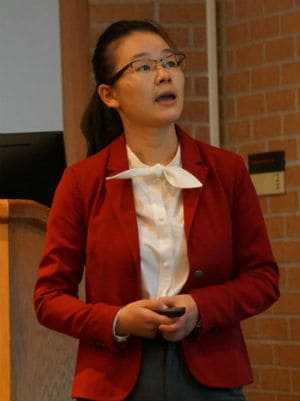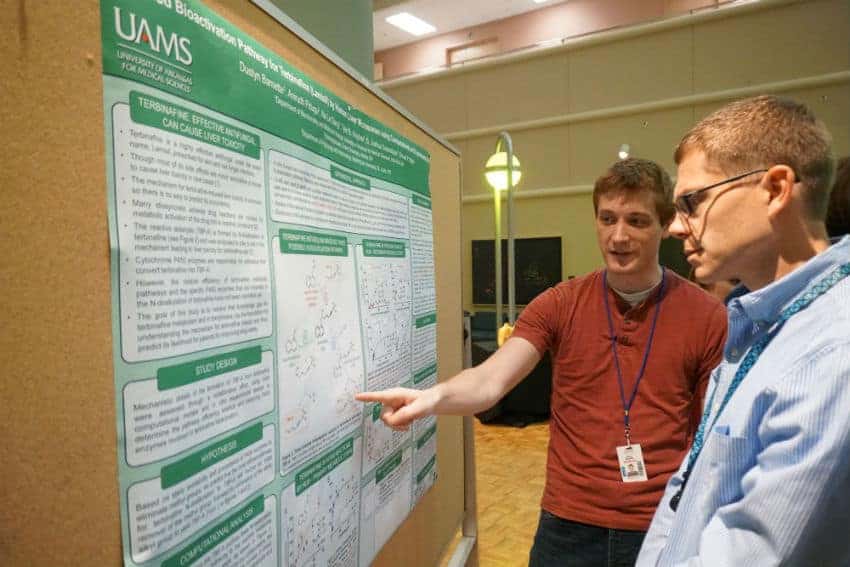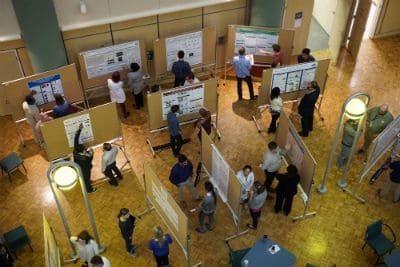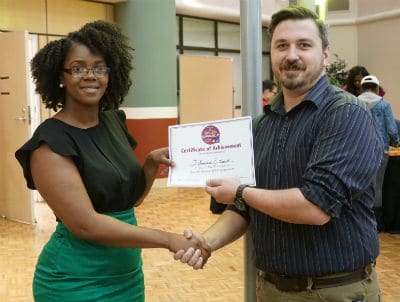Collaboration, Practice, Exposure: Graduate Symposium Offers Plenty
| Nov. 6, 2017 | Each student at the UAMS Graduate Student Association Research Symposium was prepared, organized and confident – and maybe a little nervous.
Twenty-nine UAMS Graduate School students participated in the Oct. 27 daylong event, held in the Helen Guinn Adams Atrium and the Rayford Auditorium of the Biomedical Research buildings. Poster presentations were in the morning and oral presentations in the afternoon. Each presentation involved a novel approach to medical research covering a broad selection of topics.
Organized by the Graduate Student Association, this was the fourth year for the event, which provides students the opportunity to hone their presentation and gain valuable feedback.
“The symposium is a unique Graduate School event in that it is entirely organized and led by students,” said Robert McGehee, Ph.D., dean of the UAMS Graduate School and executive director of the Arkansas Biosciences Institute. “It not only gives graduate students an opportunity to present their dissertation research in a friendly environment, but allows them to gain experience in managing an event.”
Students organize the entire event, choose whether they want to submit a poster or oral presentation, and for the first time this year, arrange for guest speakers and travel.
“The concept of the event is to mimic a typical conference presentation format, similar to one of our professional organizations or societies, and is intended to give the students experience and feedback on their presentation and work prior to attending a national or international conference,” said Gregory Berbusse, M.S., GSA president.
All judging is done by faculty, Berbusse said. This year, more than 30 faculty members volunteered their time to read abstracts, judge posters and score presentations. The GSA’s efforts were also supported by the Graduate School office: Associate Dean Kristen Sterba, Ph.D.; Regina Dennis, Allyson Douglass and McGehee.

Xingui Liu, a fourth-year graduate student in the College of Pharmacy’s Department of Pharmaceutical Sciences, presented her research during the afternoon sessions.
Judges with clipboards in hand moved from poster to poster, listening intently to each presenter and engaging them with questions.
Presentations covered a wide variety of topics, from the mumps virus and liver toxicity to weight gain, depression and methamphetamine.
“It’s a time for you to be able to showcase all the data that you have,” said Amanda Dragan, a second-year graduate student. “Everyone in each lab should be really proud of all of the data that they came up with.”
“We get exposure, and we get to talk to the faculty and students in other departments who are actually doing interrelated work,” said Naleen Raj Bhandari, a third-year graduate student in the College of Pharmacy’s Pharmaceutical Evaluation and Policy program.
Bhandari said the symposium provides opportunities for meaningful professional connections and praised the collaborative efforts between students and faculty spread across campus.
“The good thing about this is we might get the opportunity to run into a clinician, who might look at our poster and say, ‘Okay, this is clinically important work,’” Bhandari said.
Of the 26 morning poster presentations, eight were pre-selected by faculty to make oral presentations. This year, the GSA collaborated with Texas A&M University to begin a student seminar series, and invited a Texas A&M student, Mary Grigar, to deliver a keynote speech and presentation.
“It was a new initiative this year,” McGehee said. “We partnered with Texas A&M to select an outstanding student from each institution to invite. We sent a student to them, and they sent a student to us, and her talk was coupled with our symposium.”
Each student was strictly timed for their oral presentation – 15 minutes maximum. Students condensed years’ worth of work into that time, using laser pointers to highlight key data points and quickly rattling off their findings. Having a time limit helps students sharpen their focus, Berbusse said.
It can still be a bit nerve-wracking, said Kimberly Cooney, a senior graduate student in the College of Medicine’s Department of Biochemistry and Molecular Biology.
“I’m always nervous,” Cooney said. “But it gets easier – being in graduate school prepares you for public speaking. An effective scientist is able to communicate their research.”
The short presentations are good practice for something even smaller: a “three-minute thesis” that McGehee encourages graduate students to participate in, Cooney said.
“Sometimes you don’t have an hour to talk about your data – you have to get to the point. For example, if you meet someone in the elevator at a conference you only have a few minutes to really sell your project.”
Awards were given for the top three presenters in the poster and oral categories:
- Johnasha Stuart, first place oral presentation
- Bradley Shields, second place oral presentation
- Samantha McClenahan and Brad Martins, third place oral presentation (tie)
- William MacCain, first place poster presentation
- Keisha Cawley, second place poster presentation
- Lauren Davis, third place poster presentation
McGehee was proud of the work the students put in, from start to finish.
“Learning how to do science is really important, but equally important is learning how to communicate your work and to start building a network of people you can reach out to for advice and support down the road,” McGehee said. “Events like this contribute significantly to our students’ career development, and they do a fantastic job with it.”


